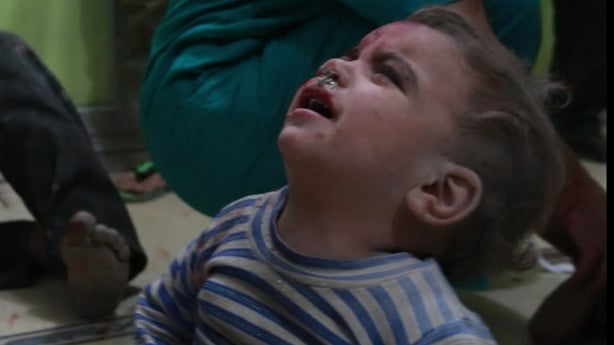At least 14 people were killed when an aid convoy was hit in Aleppo province, the United Nations said, as the Syrian military declared that a week-long ceasefire was over.
The Syrian Observatory for Human Rights monitoring group said the attacks were carried out by either Syrian or Russian aircraft.
It said there had been 35 strikes in and around Aleppo since the truce ended.
Fourteen Syrian Arab Red Crescent volunteers were killed, Elhadj As Sy, secretary general of the International Federation of Red Cross and Red Crescent Societies, told a UN summit.
At least 18 of 31 trucks in a UN and Syrian Arab Red Crescent (SARC) convoy were hit along with an SARC warehouse, said UN spokesman Stephane Dujarric.
The convoy was delivering aid for 78,000 people in the hard-to-reach town of Urm al-Kubra,he said.
"Our outrage at this attack is enormous," said the UN Special Envoy for Syria, Staffan de Mistura, in a statement emailed by his spokeswoman.
"The convoy was the outcome of a long process of permission and preparations to assist isolated civilians."
The developments appeared to signal that the latest effort to halt Syria's civil war was close to collapse.

Syria's army said the seven-day truce period had ended.
It accused "terrorist groups," a term the government uses for all insurgents, of exploiting the calm to rearm while violating the ceasefire 300 times, and vowed to "continue fulfilling its national duties in fighting terrorism in order to bring back security and stability".
Moscow supports Syrian President Bashar al-Assad with its air force. The Syrian military could not immediately be reached for comment.
France condemned the attack on the aid convoy saying it showed the urgent need to impose a ceasefire in the country.
"France strongly condemns the destruction of a humanitarian convoy in Syria and the death of all the personnel in it," Foreign Ministry spokesman Romain Nadal said, citing remarks made by the foreign minister at the start of a closed meeting on Syria.
"This destruction illustrates the urgency of a ceasefire."
The week-old attempt at a ceasefire, negotiated by US Secretary of State John Kerry and Russian Foreign Minister Sergei Lavrov, could be the final attempt by President Barack Obama to negotiate an end to the civil war.
Mr Kerry called on Moscow to halt Syrian government airstrikes, including on aid convoys, and indicated that the United States had not received official word from Russia that the ceasefire deal was dead.
"The Russians made the agreement. So we need to see what the Russians say," Mr Kerry said before meeting Saudi Crown Prince Mohammed bin Nayef in New York.
"But the point - the important thing is the Russians need to control Assad, who evidently is indiscriminately bombing, including of humanitarian convoys."
A senior US official later said the air strike on the aid convoy has dealt a serious blow to peace efforts, while another said it is still unclear whether it was Russian or Syrian war planes that hit the convoy.
The United Nations said that only Washington and Moscow could declare the ceasefire over, as they were the ones who originally forged the deal.
The air strikes appeared particularly heavy in insurgent-held areas west of Aleppo, near the rebel stronghold of Idlib province.
Russian and US officials met in Geneva to try to extend the truce, and the International Syria Support Group - the countries backing the Syria peace process - was scheduled to meet tomorrow in New York to assess the agreement.
But like the Syrian army, the rebels spoke of returning to the battlefield.
The coordinator of Syria's main opposition group said that the ceasefire never took hold and called on the world to put an end to the "criminality" of the Syrian government.
"There was no ceasefire to begin with for us to say whetherit failed or succeeded," Riad Hijab, general coordinator of the High Negotiations Committee, told reporters.
Aid was delivered to the besieged town of Talbiseh in Homs province today, the Red Cross said, for the first time since July. The convoy brought in food, water and hygiene supplies for up to 84,000 people, it said.
But most aid shipments envisaged under the truce have yet to go in.
The United Nations said it had received government approval to reach nearly all the besieged and hard-to-reach areas where it sought to bring aid, but access to many areas was still constrained by fighting, insecurity and administrative delays.
Already widely violated since it took effect, the ceasefire came under added strain at the weekend when Russia said jets from the US-led coalition against Islamic State killed more than 60 Syrian soldiers in eastern Syria.
President Assad called that incident "flagrant aggression". Washington called it a mistake.
The ceasefire is the second negotiated by Washington and Moscow since Russia joined the war in September 2015.
But while it led to a significant reduction in fighting at the outset, violence has increased in recent days and aid has mostly failed to arrive.

